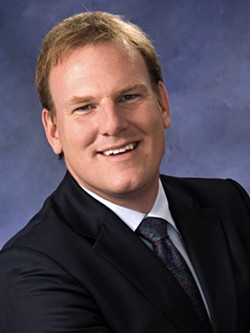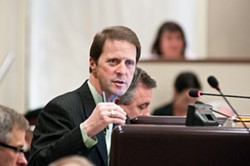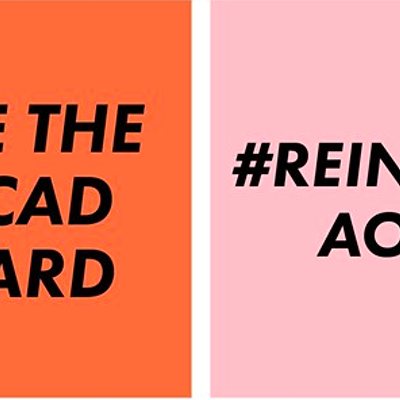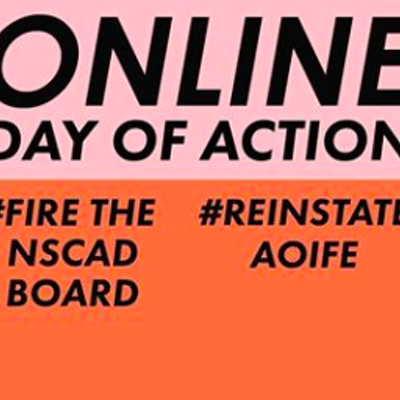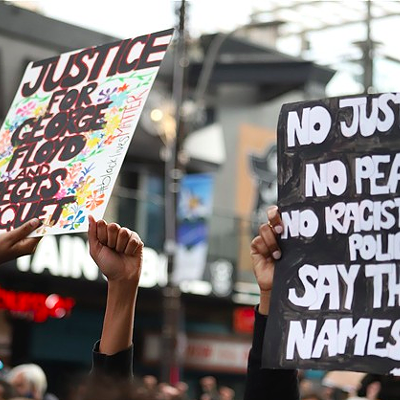Of course, the dead can't take it with them, which is why we have the byzantine probate process, which regulates how wills are administrated, and what happens if someone dies without a will. Today, we asked Cora Jacquemin, Nova Scotia's registrar of probate, how much money goes through the system every year.
"Gee, I have no idea," says Jacquemin. And Jacquemin can't point us to any resources to help us out.
We do know that about 8,500 people die every year in Nova Scotia. Some of those will be filthy rich millionaires. Some of them will be average people with maybe a house with some equity, a car, some money in the bank and some credit card bills. Others still will be paupers, with not a penny to their name and a boatload of debt. (Don't worry, we don't have debt inheritance in Canada. You won't be stuck with your deadbeat uncle's unpaid bar tab after he dies.)
A lot of the money belonging to dead people never makes it to probate. They have surviving spouses, who continue on with the jointly owned property. Or they're kids, and the parents keep whatever property was at stake.
How much money do dead people have, on average? We'll throw a figure out there, just for argument: $25,000. We've looked at a lot of probate cases over the last couple of years, so we have some idea of these things. Twenty-five thousand dollars isn't a complete stab in the dark, but neither are we comfortable calling it an educated guess. Call it half way between a stab in the dark and an educated guess—a stab at a guess, maybe. We're the first to admit that the real figure might be ten times as much. Or tens times less. Who knows?
But if it is $25,000 per dead person, and there are 8,500 dead people, that's $210 million worth of dead people money, every year, moving through the probate system.
Most of the people charged with making sure that dead people money goes where it's supposed to go—they're called "executors"—are conscientious and ethical. Let's be gracious and uncynical types and say that fully 98 percent of executors do a bang-up job.
That leaves just two percent who are inept or, well, thieving bastards. And two percent of $210 million is still $4.2 million.
That's $4.2 million, each and every year, that isn't going where it's supposed to be going. Widows cheated out of a supplementary income for their sunset years. New families who could've used a small inheritance to add a baby room to the house. Charities, who always need every penny they can get. You get the idea.
How to not say "Peter Kelly" at Province House
Today, the legislature's Public Accounts committee reviewed something call the Public Trustee, which is a crown corporation charged with taking care of the finances of old people who can't manage it themselves, and of managing estates of people who haven't named an executor in a will, as well as other similar services.By all accounts the Public Trustee does an excellent job. It's never been sued. And auditor general Jacques Lapointe has praised it. "We found the Office of Public Trustee managed client investments appropriately, using the prudent investor approach outlined in the policy," wrote Lapointe in last year's audit of the corporation.
But the presence of Estelle Theriault, who oversees operations of the Public Trustee, at the legislature gave MLA Andrew Younger the opportunity to point out what he deemed "a gap in the legislation" related to probate.
"If somebody dies, who hasn't been under the care of the Public Trustee, and there's an issue with the way the will is being executed—maybe there's a missing executor, maybe the executor, it could be all sorts of things," said Younger to Theriault. "I'm trying to figure out if you have the authority to deal with a situation where the terms of the Probate Act are not being met. Do you have the ability to go in on your own accord, or from a request from a member of the public?"
"No, we don't," answered Theriault. "There is a clause in the [Probate] Act that says an estate should be closed within 18 months. So the interested parties, the beneficiaries, the heirs, do have the right to seek an order that the registrar will order the executor to come to court to show cause as to why the estate's not progressing."
"But they would have to know that they're beneficiaries first, and that's the gap that I'm getting at" pointed out Younger. "If you speak to Probate Court, they will say the same thing. They'll say, 'well, it's up to the heirs of the estate to come and tell us that it hasn't been dealt with'...The Probate Court and the Public Trustee both say if it's not settled in 18 months, the heirs can come [and ask the court to remove the executor]. And that's right. But the heirs of course have to know that they are heirs in order to do that. If the heir is not being appropriately probated, they may not know that they are heirs."
The rules of Province House disallow any mention of a member of the public's personal situation, unless that person first agrees, so there was a sort of dance around the issue, but by now you've figured out that Younger and Theriault were talking obliquely about the estate of Mary Thibeault, which was horribly mismanaged—or worse—by former Halifax mayor Peter Kelly.
By law, within 30 days of being named executor, Kelly was required to notify each heir that they were named in Thibeault's will, and then to file the process server's receipt, or the registered mail receipt, with the court. Kelly didn't do that within 30 days. In fact, all the heirs only received notification after The Coast's expose on the estate, more than seven years after Thibeault had died. Kelly later explained that he was "tardy."
It's true that even though they weren't officially notified, most of the people named as heirs in Thibeault's will knew they were heirs, but for whatever reason, they opted not to ask the court to remove Kelly. They were free to make that decision. But the five charities named in Thibeault's will were not free to make that decision—they couldn't decide because they didn't know they were heirs, and they didn't know because Kelly had never notified them.
These charities were being deprived of a total of at least $210,000.
Kelly's mishandling of the Thibeault estate made national news and led to his decision not to run for reelection, but while the dollar amounts involved are substantial in their own right, they're likely a drop in the bucket in terms of the larger problem.
The Coast was very fortunate to have stumbled upon the problems with the Thibeault estate and then to be able to detail the specifics, but there are undoubtedly many other problem-plagued estates that fly below the radar screen. If a specific systematic failure can happen once, it can happen again. And again. If our stab at a guess is right, there are so many systematic failures that there's another $4.2 million in misappropriated or otherwise bungled dead people money in Nova Scotia, each and every year.
Shouldn't we do something about that?
Fixing the broken part of the system
Here's the specific systematic failure we've identified in Nova Scotia's probate process: Executors can, and have, failed to notify heirs that they are in fact heirs. Since the heirs don't know that they're heirs, they also don't know that they have the right to ask the court to intervene to help them get their inheritances.When Younger pointed this out, Theriault, the Public Trustee, offered lamely that all people named in wills are listed in the Royal Gazette. The Royal Gazette is "the Province's official weekly government record of proclamations and other statutory notices." Some of the MLAs at Province House today didn't know it existed, or where to find it. Certainly, most of the public is completely ignorant of the Gazette. But Theriault seemed to suggest that we all regularly read it, just in case our names popped up as heirs to an estate.
In a scrum with reporters after Public Accounts, Theriault declined to discuss the Kelly case, and said the "gap" that Younger had identified was a policy issue, outside of her jurisdiction. She's right about that.
This afternoon we spoke with Jacquemin, the registrar of the Probate Court. She understood the issue we had identified. We spoke at length about the legal requirement for executors to notify heirs, and to enter the paperwork into the court record.
But, she said, "executors are requited to swear an oath to faithfully meet the terms of the Probate Act."
"But in Peter Kelly's case, he swore the oath, and then didn't faithfully meet the terms of the Act," we pointed out. "And no one cares."
"I can't speak to that," said Jacquemin.
It gets frustrating, talking about this flaw in the process. People in positions of authority seem to simultaneously admit there's a breakdown in the system and say there isn't a breakdown in the system. They say executors can be held to account because they must swear an oath, but when executors violate that oath, the authorities do nothing. The authorities say the heirs can move the process along, but sure, maybe the heirs don't know they're heirs, but that's only because the heirs don't faithfully read an obscure government newspaper.
Look, there are probably a lot of people getting ripped off by unscrupulous executors. How 'bout we cut through the crap and do something about it?
Obviously, there needs to be in place a system to verify that all heirs are properly notified. In fact, the paperwork should be right in the court file, right in the courthouse, right on Water Street, a building filled with clerks and administrators. Maybe some of them could, you know, look in the files and see if the notifications have been properly made.
Jacquemin says she doesn't have the resources to do that and, again in the Bizarro world of bureaucratic logic, it's up to the un-notified heirs to complain about not being notified.
But we insist this is a solvable problem. A simple line of computer code could notify a clerk, say 45 days after an executor is named, to go check the file and see if the proper notifications have been made.
This isn't an overwhelming chore. Even if all 8,500 dead people entered into the probate system, that would be about 30 files checked per working day. Probably it could fit into the current work scheme. But even if we had to hire a full-time person to do the check, it'd be—what?—$50,000 in salary to save $4.2 million in dead people money.
Isn't that worth it?


